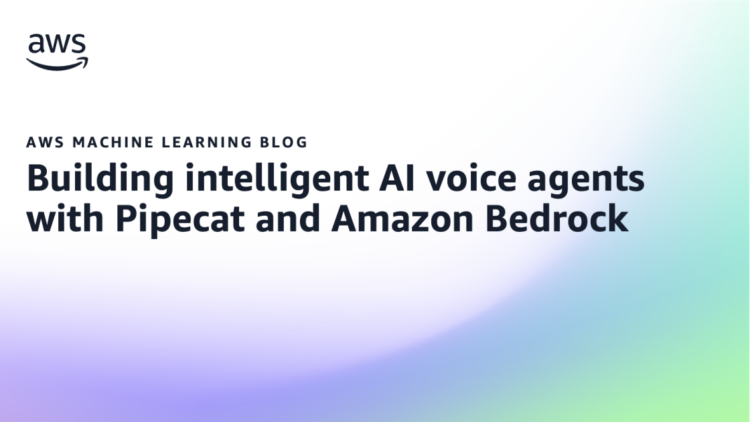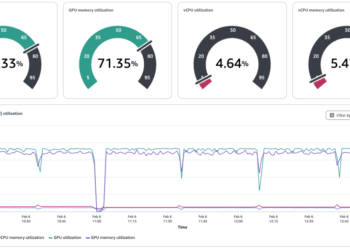Voice AI is reworking how we work together with expertise, making conversational interactions extra pure and intuitive than ever earlier than. On the identical time, AI brokers have gotten more and more refined, able to understanding complicated queries and taking autonomous actions on our behalf. As these traits converge, you see the emergence of clever AI voice brokers that may interact in human-like dialogue whereas performing a variety of duties.
On this sequence of posts, you’ll learn to construct clever AI voice brokers utilizing Pipecat, an open-source framework for voice and multimodal conversational AI brokers, with basis fashions on Amazon Bedrock. It contains high-level reference architectures, finest practices and code samples to information your implementation.
Approaches for constructing AI voice brokers
There are two frequent approaches for constructing conversational AI brokers:
- Utilizing cascaded fashions: On this put up (Half 1), you’ll study in regards to the cascaded fashions strategy, diving into the person elements of a conversational AI agent. With this strategy, voice enter passes by a sequence of structure elements earlier than a voice response is shipped again to the consumer. This strategy can also be typically known as pipeline or part mannequin voice structure.
- Utilizing speech-to-speech basis fashions in a single structure: In Half 2, you’ll learn the way Amazon Nova Sonic, a state-of-the-art, unified speech-to-speech basis mannequin can allow real-time, human-like voice conversations by combining speech understanding and technology in a single structure.
Frequent use instances
AI voice brokers can deal with a number of use instances, together with however not restricted to:
- Buyer Help: AI voice brokers can deal with buyer inquiries 24/7, offering prompt responses and routing complicated points to human brokers when essential.
- Outbound Calling: AI brokers can conduct personalised outreach campaigns, scheduling appointments or following up on leads with pure dialog.
- Digital Assistants: Voice AI can energy private assistants that assist customers handle duties, reply questions.
Structure: Utilizing cascaded fashions to construct an AI voice agent
To construct an agentic voice AI software with the cascaded fashions strategy, you want to orchestrate a number of structure elements involving a number of machine studying and basis fashions.

Determine 1: Structure overview of a Voice AI Agent utilizing Pipecat
These elements embody:
WebRTC Transport: Allows real-time audio streaming between shopper gadgets and the appliance server.
Voice Exercise Detection (VAD): Detects speech utilizing Silero VAD with configurable speech begin and speech finish occasions, and noise suppression capabilities to take away background noise and improve audio high quality.
Automated Speech Recognition (ASR): Makes use of Amazon Transcribe for correct, real-time speech-to-text conversion.
Pure Language Understanding (NLU): Interprets consumer intent utilizing latency-optimized inference on Bedrock with fashions like Amazon Nova Professional optionally enabling immediate caching to optimize for pace and value effectivity in Retrieval Augmented Technology (RAG) use instances.
Instruments Execution and API Integration: Executes actions or retrieves data for RAG by integrating backend providers and knowledge sources by way of Pipecat Flows and leveraging the software use capabilities of basis fashions.
Pure Language Technology (NLG): Generates coherent responses utilizing Amazon Nova Professional on Bedrock, providing the precise stability of high quality and latency.
Textual content-to-Speech (TTS): Converts textual content responses again into lifelike speech utilizing Amazon Polly with generative voices.
Orchestration Framework: Pipecat orchestrates these elements, providing a modular Python-based framework for real-time, multimodal AI agent purposes.
Finest practices for constructing efficient AI voice brokers
Creating responsive AI voice brokers requires concentrate on latency and effectivity. Whereas finest practices proceed to emerge, contemplate the next implementation methods to realize pure, human-like interactions:
Reduce dialog latency: Use latency-optimized inference for basis fashions (FMs) like Amazon Nova Professional to keep up pure dialog circulate.
Choose environment friendly basis fashions: Prioritize smaller, sooner basis fashions (FMs) that may ship fast responses whereas sustaining high quality.
Implement immediate caching: Make the most of immediate caching to optimize for each pace and value effectivity, particularly in complicated situations requiring information retrieval.
Deploy text-to-speech (TTS) fillers: Use pure filler phrases (reminiscent of “Let me look that up for you”) earlier than intensive operations to keep up consumer engagement whereas the system makes software calls or long-running calls to your basis fashions.
Construct a sturdy audio enter pipeline: Combine elements like noise to help clear audio high quality for higher speech recognition outcomes.
Begin easy and iterate: Start with fundamental conversational flows earlier than progressing to complicated agentic techniques that may deal with a number of use instances.
Area availability: Low-latency and immediate caching options could solely be obtainable in sure areas. Consider the trade-off between these superior capabilities and choosing a area that’s geographically nearer to your end-users.
Instance implementation: Construct your individual AI voice agent in minutes
This put up supplies a pattern software on Github that demonstrates the ideas mentioned. It makes use of Pipecat and and its accompanying state administration framework, Pipecat Flows with Amazon Bedrock, together with Net Actual-time Communication (WebRTC) capabilities from Day by day to create a working voice agent you’ll be able to strive in minutes.
Conditions
To setup the pattern software, you must have the next conditions:
- Python 3.10+
- An AWS account with acceptable Id and Entry Administration (IAM) permissions for Amazon Bedrock, Amazon Transcribe, and Amazon Polly
- Entry to basis fashions on Amazon Bedrock
- Entry to an API key for Day by day
- Trendy internet browser (reminiscent of Google Chrome or Mozilla Firefox) with WebRTC help
Implementation Steps
After you full the conditions, you can begin organising your pattern voice agent:
- Clone the repository:
git clone https://github.com/aws-samples/build-intelligent-ai-voice-agents-with-pipecat-and-amazon-bedrock cd build-intelligent-ai-voice-agents-with-pipecat-and-amazon-bedrock/part-1 - Arrange the surroundings:
cd server python3 -m venv venv supply venv/bin/activate # Home windows: venvScriptsactivate pip set up -r necessities.txt - Configure API key in
.env:DAILY_API_KEY=your_daily_api_key AWS_ACCESS_KEY_ID=your_aws_access_key_id AWS_SECRET_ACCESS_KEY=your_aws_secret_access_key AWS_REGION=your_aws_region - Begin the server:
python server.py - Join by way of browser at
http://localhost:7860and grant microphone entry - Begin the dialog together with your AI voice agent
Customizing your voice AI agent
To customise, you can begin by:
- Modifying
circulate.pyto vary dialog logic - Adjusting mannequin choice in
bot.pyon your latency and high quality wants
To study extra, see documentation for Pipecat Flows and overview the README of our code pattern on Github.
Cleanup
The directions above are for organising the appliance in your native surroundings. The native software will leverage AWS providers and Day by day by AWS IAM and API credentials. For safety and to keep away from unanticipated prices, if you end up completed, delete these credentials to make it possible for they’ll now not be accessed.
Accelerating voice AI implementations
To speed up AI voice agent implementations, AWS Generative AI Innovation Heart (GAIIC) companions with clients to determine high-value use instances and develop proof-of-concept (PoC) options that may shortly transfer to manufacturing.
Buyer Testimonial: InDebted
InDebted, a world fintech reworking the buyer debt trade, collaborates with AWS to develop their voice AI prototype.
“We imagine AI-powered voice brokers characterize a pivotal alternative to reinforce the human contact in monetary providers buyer engagement. By integrating AI-enabled voice expertise into our operations, our objectives are to supply clients with sooner, extra intuitive entry to help that adapts to their wants, in addition to bettering the standard of their expertise and the efficiency of our contact centre operations”
says Mike Zhou, Chief Information Officer at InDebted.
By collaborating with AWS and leveraging Amazon Bedrock, organizations like InDebted can create safe, adaptive voice AI experiences that meet regulatory requirements whereas delivering actual, human-centric affect in even probably the most difficult monetary conversations.
Conclusion
Constructing clever AI voice brokers is now extra accessible than ever by the mixture of open-source frameworks reminiscent of Pipecat, and highly effective basis fashions with latency optimized inference and immediate caching on Amazon Bedrock.
On this put up, you discovered about two frequent approaches on how one can construct AI voice brokers, delving into the cascaded fashions strategy and its key elements. These important elements work collectively to create an clever system that may perceive, course of, and reply to human speech naturally. By leveraging these fast developments in generative AI, you’ll be able to create refined, responsive voice brokers that ship actual worth to your customers and clients.
To get began with your individual voice AI challenge, strive our code pattern on Github or contact your AWS account staff to discover an engagement with AWS Generative AI Innovation Heart (GAIIC).
You can even find out about constructing AI voice brokers utilizing a unified speech-to-speech basis fashions, Amazon Nova Sonic in Half 2.
In regards to the Authors
 Adithya Suresh serves as a Deep Studying Architect on the AWS Generative AI Innovation Heart, the place he companions with expertise and enterprise groups to construct modern generative AI options that deal with real-world challenges.
Adithya Suresh serves as a Deep Studying Architect on the AWS Generative AI Innovation Heart, the place he companions with expertise and enterprise groups to construct modern generative AI options that deal with real-world challenges.
 Daniel Wirjo is a Options Architect at AWS, targeted on FinTech and SaaS startups. As a former startup CTO, he enjoys collaborating with founders and engineering leaders to drive development and innovation on AWS. Outdoors of labor, Daniel enjoys taking walks with a espresso in hand, appreciating nature, and studying new concepts.
Daniel Wirjo is a Options Architect at AWS, targeted on FinTech and SaaS startups. As a former startup CTO, he enjoys collaborating with founders and engineering leaders to drive development and innovation on AWS. Outdoors of labor, Daniel enjoys taking walks with a espresso in hand, appreciating nature, and studying new concepts.
 Karan Singh is a Generative AI Specialist at AWS, the place he works with top-tier third-party basis mannequin and agentic frameworks suppliers to develop and execute joint go-to-market methods, enabling clients to successfully deploy and scale options to unravel enterprise generative AI challenges.
Karan Singh is a Generative AI Specialist at AWS, the place he works with top-tier third-party basis mannequin and agentic frameworks suppliers to develop and execute joint go-to-market methods, enabling clients to successfully deploy and scale options to unravel enterprise generative AI challenges.
 Xuefeng Liu leads a science staff on the AWS Generative AI Innovation Heart within the Asia Pacific areas. His staff companions with AWS clients on generative AI tasks, with the objective of accelerating clients’ adoption of generative AI.
Xuefeng Liu leads a science staff on the AWS Generative AI Innovation Heart within the Asia Pacific areas. His staff companions with AWS clients on generative AI tasks, with the objective of accelerating clients’ adoption of generative AI.




